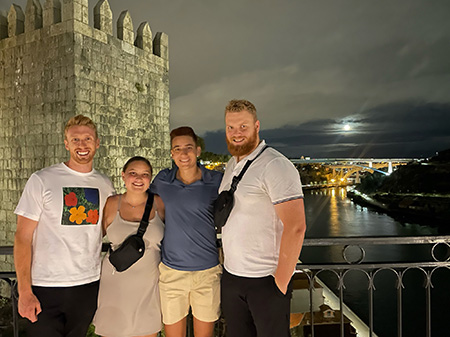
In 2021, at a time when she was serving as the director of Continuing Education at WMed, Nancy Bjorklund, EdD, MPA, was asked to take on a new challenge, one that would tap into her expertise in – and passion for – global education.
The task before her was to build the infrastructure and support system to enhance global engagement at the medical school and put in place a curriculum and electives to expose WMed learners, faculty, and staff to international medical practices, healthcare systems, and innovative treatments.
“The exposure really enhances the ability to adapt to various patient needs and fosters a more inclusive approach to patient care,” Dr. Bjorklund said. “Global education in medical training promotes cross-cultural competency and enables healthcare providers to work effectively in a multicultural and diverse healthcare environment. That is particularly vital in countries with diverse patient populations like the U.S. or even regionally in Southwest Michigan.”
Now, some two years later, WMed has built several partnerships with medical schools in Portugal and South Korea – the University of Minho School of Medicine in Braga, Portugal; the University of Catholica School of Medicine in Lisbon, Portugal, and Seoul National University – and a cohort of six M4s from the medical school completed a four-week pilot rotation in Braga in September that for many of them proved life-changing.
During their time in Europe, the students – Lucas Bezerra, Kira Couch, Elle Davio, Cruz Gutierrez, Shivani Reddy, and Patrick Reichhold – got the opportunity to participate in classroom learning, as well as medical observation and training at Hospital de Braga. They also attended weekly seminars focused on European Union healthcare systems and health management and leadership, as well as cultural programming.
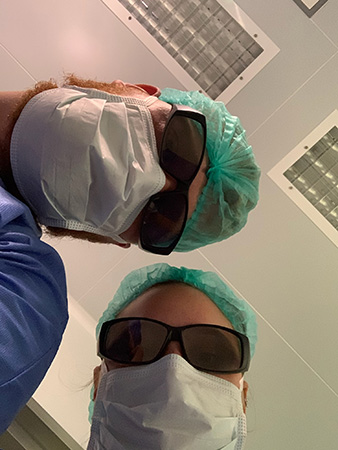
“I had a really memorable experience,” Reddy said. “It was a great opportunity to learn about a different healthcare system, one that is quite different from what we have in the U.S. I also felt it was really important for us to get that exposure to a different culture because it helps build our cultural awareness and competency and develops us into really compassionate and competent physicians who can care for patients from all walks of life and all across the world.”
The students who visited Portugal were able to do so with a small amount of out-of-pocket cost, and Dr. Bjorklund said the elective is eligible for financial aid assistance. The increased focus on global education at WMed builds upon programming that has been in place for many years at the medical school around global health, which have given students, resident physicians, and faculty opportunities to provide healthcare in resources-limited settings such as Madagascar and Peru.
While those global health electives will continue, Dr. Bjorklund’s work to expand global education and global engagement opportunities for medical students provides increased access to global experiences with a focus on learner development, said Mike Busha, MD, MBA, the medical school’s chief academic officer and senior associate dean for Academic Affairs.
“The curriculum leadership within undergraduate medical education recognizes the value of global experiences across multiple different settings and we are excited about the growth in student opportunities to advance those developmental experiences across a much larger portion of our student population than we have historically been able to do,” Dr. Busha said. “I’m super excited about the educational hub that we are developing in Portugal, as well as our initial development phase in Asia. Specifically for WMed, I think the experiences and the focus on cultural competency in a variety of healthcare settings is really fundamental to our internal development around health equity, which is the foundation of our mission, vision, and values.”
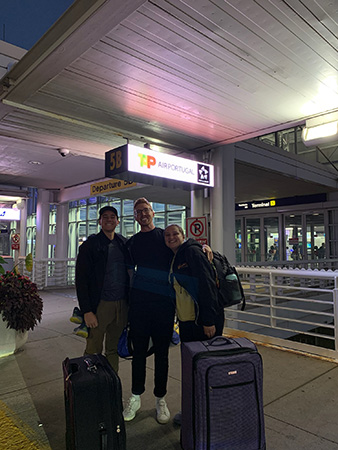
It was Dr. Busha who approached Dr. Bjorklund in 2021 about leading efforts to expand global education opportunities at WMed. Dr. Bjorklund, who now serves as assistant dean for Global and Continuing Education, said her work, as well as efforts around global health, all fits under the umbrella of what is commonly referred to as the internationalization of medical education (IoMe).
Moving forward, Dr. Bjorklund said a cohort of WMed students will visit Portugal again next September and students will also have the opportunity for the first time to take part in a four-week elective rotation in South Korea. There are also plans to build other partnerships that could lead to at least three additional learning hubs across the globe.
Additionally, Dr. Bjorklund said WMed leaders, as well as leaders at the University of Minho School of Medicine and Seoul National University, are formalizing reciprocal short-term programming and a learning exchange for students from both schools to visit WMed. As efforts continue, she said she is hopeful that the partnerships will lead to faculty exchanges and collaborations that could advance medical research and innovation, and improve patient care on a global scale.
“There aren’t many medical schools that are doing this in terms of global education where students are getting the chance to have these experiences,” Dr. Bjorklund said. “It’s very innovative in the way it is giving students a totally different perspective that goes beyond traditional global health experiences. The entirety of the developed experiences are around learner impact and development which will help shape their perspectives and abilities as future advocates and leaders in healthcare.”
For Reddy and the other students who were part of the first cohort to complete the elective rotation in Portugal, the experience provided them with a breadth of opportunities. Personally, they were able to immerse themselves into Portuguese culture and they gained an appreciation for the country’s many traditions. Professionally, they got to observe medical procedures up close and learn from patient-physician interactions in another country. They also had unique opportunities like the chance to meet Portugal’s first-ever MD-PhD dual degree holder and they got to witness the ins and outs – and positives and negatives – of a national public healthcare system.
“For me, going into family medicine, each community I will go into in residency will have different barriers that are easier to address than others, such as the price of prescriptions or transportation,” Gutierrez said. “I’m not going to solve the whole system but I think it definitely opened my eyes to the importance of searching out advocacy opportunities and being a part of those efforts to improve the system.”
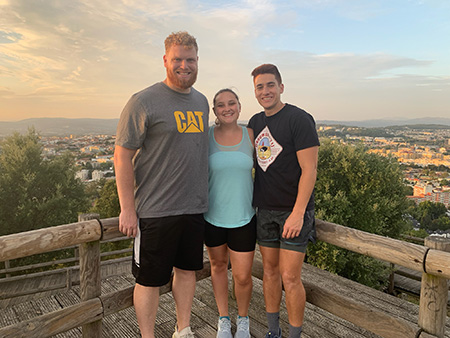
Gutierrez said he also appreciated the chance to observe patient and physician encounters in another country as someone who doesn’t speak the native language. The experience, he said, prompted him to think about how he can best serve patients in the U.S. who do not speak English.
“It really equips me with that cultural competency no matter where I go,” he said.
While in Portugal, the students lived in student housing with learners from across the globe including Austria, Brazil, Germany, Italy, and Spain. Davio said the students she met were studying a wide variety of disciplines apart from medicine. She said she’s planning a return trip to Portugal in the spring to attend the commencement of a student from Brazil who will be graduating from law school.
“My favorite part of the entire experience was the people,” Davio said. “I formed deep friendships that I will carry with me forever. I also really appreciated the opportunity to work with such amazing mentors and scholars. Personal growth is just as important in medical school as learning to be a doctor and practice medicine. This really was an opportunity to challenge myself in a new way, to adapt to a new clinical environment, and integrate everything we’ve learned over the last four years. It couldn’t have been a more meaningful experience for me, and it is one that I will cherish forever.”
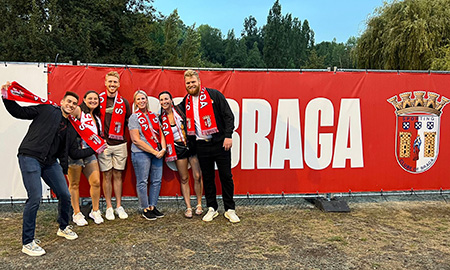
For Couch, who took part in a health-related study abroad program in Santiago, Chile, as an undergraduate student, the trip to Portugal offered the chance to expand her knowledge even more about a healthcare system outside of the U.S. She said the physicians the students met with in Portugal were welcoming and more than ready to provide their perspectives about medicine and patient care.
“I think something that a lot of the physicians said to me and showed me is you have to be adaptable and think outside the box,” Couch said. “They have a lot of resources in Portugal and it’s a high level of medicine but there are cases where they have to make do with what they have in situations we wouldn’t experience in the U.S.
“I had a wonderful time, it was definitely a highlight of medical school for me,” Couch added. “In a big-picture way, it affirmed in me that I always need to be curious and never satisfied with what I think I know about other cultures.”
For Reichhold, the trip gave him the chance to visit his aunt and uncle, as well as two cousins, in Austria prior to the elective rotation in Portugal. Couch and Gutierrez accompanied him.
Reichhold said his aunt and uncle and two cousins are all physicians and they served as inspiration for him to pursue a career in medicine. In Portugal, he said he gained an appreciation for how different medical education is in Europe compared to the U.S. For example, students in Portugal begin medical school with no undergraduate experience and that journey lasts six years. He said physicians in Portugal also earn significantly less than doctors in the U.S.
“They are really driven by the pursuit of science, altruism, a passion for medicine, and what is right and wrong,” Reichhold said. “They all had research and they were driven to push the field and drive advancements and be more than just a physician. That was really motivating for me that you can always do more.”
As he prepares for residency training with the hopes of specializing in anesthesiology, Reichhold said his experience in Portugal has been a topic of interest during residency program interviews.
“I unequivocally recommend it,” he said. “It’s really incredible and the opportunity to spend a month in another country is really rare.”
Drs. Bjorklund and Busha said they have been encouraged by the positive feedback they received from the first cohort of students who visited Portugal. Dr. Busha said the work by Dr. Bjorklund led to the global education opportunities being in place for students a full year earlier than planned.
“I think these experiences give our students a strategic advantage as they move into residency training and our goal is to really develop future healthcare leaders,” Dr. Busha said. “The exposure to these different health systems and different patient populations is very formative leadership development that will serve them well and I believe these are experiences they will carry with them and remember throughout their careers.”
